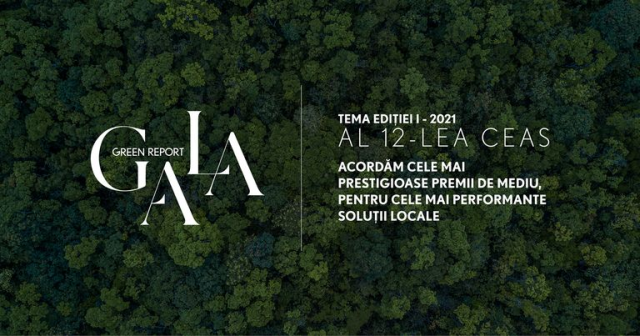Environmental sustainability projects awarded in Bucharest
The first ever Green Report Gala was organised early this year

Christine Leșcu, 23.02.2022, 14:00
“It is the 12th hour. If not now, never. If not us, nobody.” This is the imperative motto of the first edition of the Green Gala Report held early this year. The tone is set by the sense of urgency and the environmental problems of which we are all aware. The online publication Green Report has been notifying these problems for the past 15 years, ever since its establishment. But its online pages speak not only of these problems, but also put forth solutions, most of them identified by environmental watchdogs and some of them even by businesses.
In fact, the Green Report awards granted at the recent gala draw attention precisely to the way in which environmental problems start being tackled through sustainable economic projects in Romania. The awarded projects belong to NGOs, to business organisations and local authorities. Raluca Fișer, the president of Green Revolution Association, which initiated the Green Report, told us more about the criteria for selecting these projects:
Raluca Fișer: “We awarded 12 prizes, because we had 12 categories, but in the circular economy category we had 2 winners, a project put forth by a company and another one by an NGO with excellent projects in the field of circular economy. As many as 94 projects were selected in the 12 categories, and we had 54 companies and associations taking part. We were quite happy with the quality and diversity of the participating projects, which is a great thing for an event at its first edition. And we believe it is a great sign that people are becoming aware that sustainable economy is an integral part of any business plan and of any strategic approach of a market.”
The Green Report Gala also showcased the development of environmental thinking in Romania during these past 15 years.
Raluca Fișer: “Environment protection is no longer a topic for green activism alone, it has grown into a global emergency which informs the European and global agenda. We set out to show that circular economy and sustainable development are part and parcel of the business environment. An environment-friendly attitude is not only about everybody eating lettuce and walking around in forests, it also involves technology and efficiency in using our limited resources. We strongly believe that sustainable development must be integrated in any business, because it provides countless competitive advantages. And first of all, a company manager must be aware of their responsibility towards the community in which they work. Community involvement, one way or another, and the care for the environment are today so important that, if overlooked, they may push an enterprise into bankruptcy.”
The star of the Green Report Gala was an organisation called “Workshops without borders,” which won 2 awards, in the categories “Excellence in Circular Economy” with its “educlick” platform, and “Excellence in Agri-Food” for its “bio&co” social farm, and a nomination in a 3rd category. The programme director of the “Workshops without borders” association, Lorita Constantinescu, told us more about the winning projects:
Lorita Constantinescu: “We won the circular economy category with a project called EduClick. It is a platform to collect e-waste and repair computers, which we donate to schools in underprivileged areas which have no access to funding for their IT labs. Since the pandemic broke out, we have been sending computers to schools, which gave them to children who did not own a computer so that they could study online. In fact, the social component is the most important element for our association. Our social mission is to help re-include vulnerable people in the labour market. “Workshops without borders” was set up in 2008 and EduClick was the first workshop that we started. We basically created the conditions for vulnerable people to return to an active, employed life. We hire them for our workshops and for 2 years they take part in a job shadowing programme during which they learn the skills for a specific job. And when they complete the programme we help them find a job.”
This is not the only project through which “Workshops without Borders” proved that environmental protection goes hand in hand with social involvement. In the category “Excellence in Environmental Innovation,” the organisation received a nomination for its Remesh project, in which plastic banners are turned into accessories such as bags and purses. Just like with EduClick, workers from underprivileged backgrounds are employed in this social enterprise with environmental ramifications.
Lorita Constantinescu: “This is the 3rd workshop of our association: a social farm, where we grow vegetables and sell them in a farm-to-fork system. A few years ago, we set out to help vulnerable people to get employment in rural areas as well. While our first 2 projects, EduClick and Remesh, were located in Bucharest, we tried to do something for people in rural communities as well, so we went to the village of Ciocănari, some 30 km from Bucharest. We leased a plot of land and hired people from the vulnerable community in the village. It took around 3 years for us to get the organic farming certificate, and today we grow 80 vegetable varieties. We sell them to consumers in a direct subscription system.”
The farm in Ciocănari currently has just over 90 subscribers, but the organisation hopes the model will be replicated by as many enterprises as possible. (A.M.P.)






























